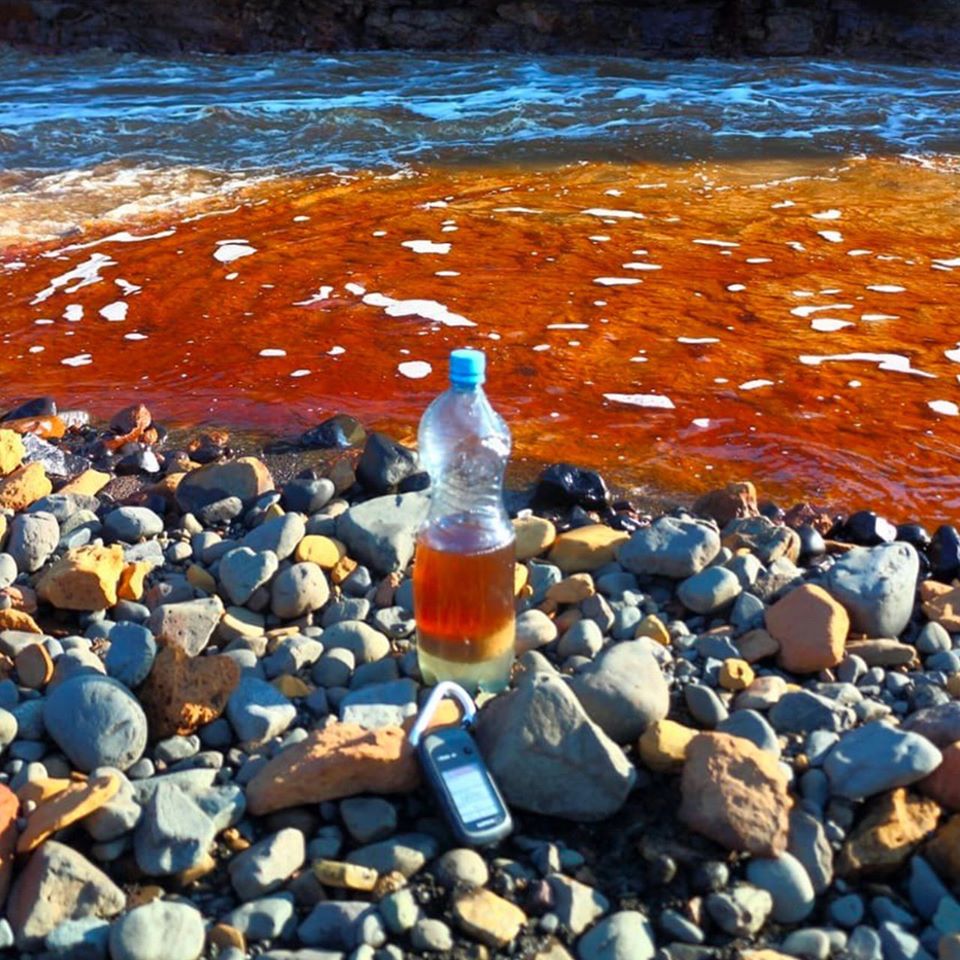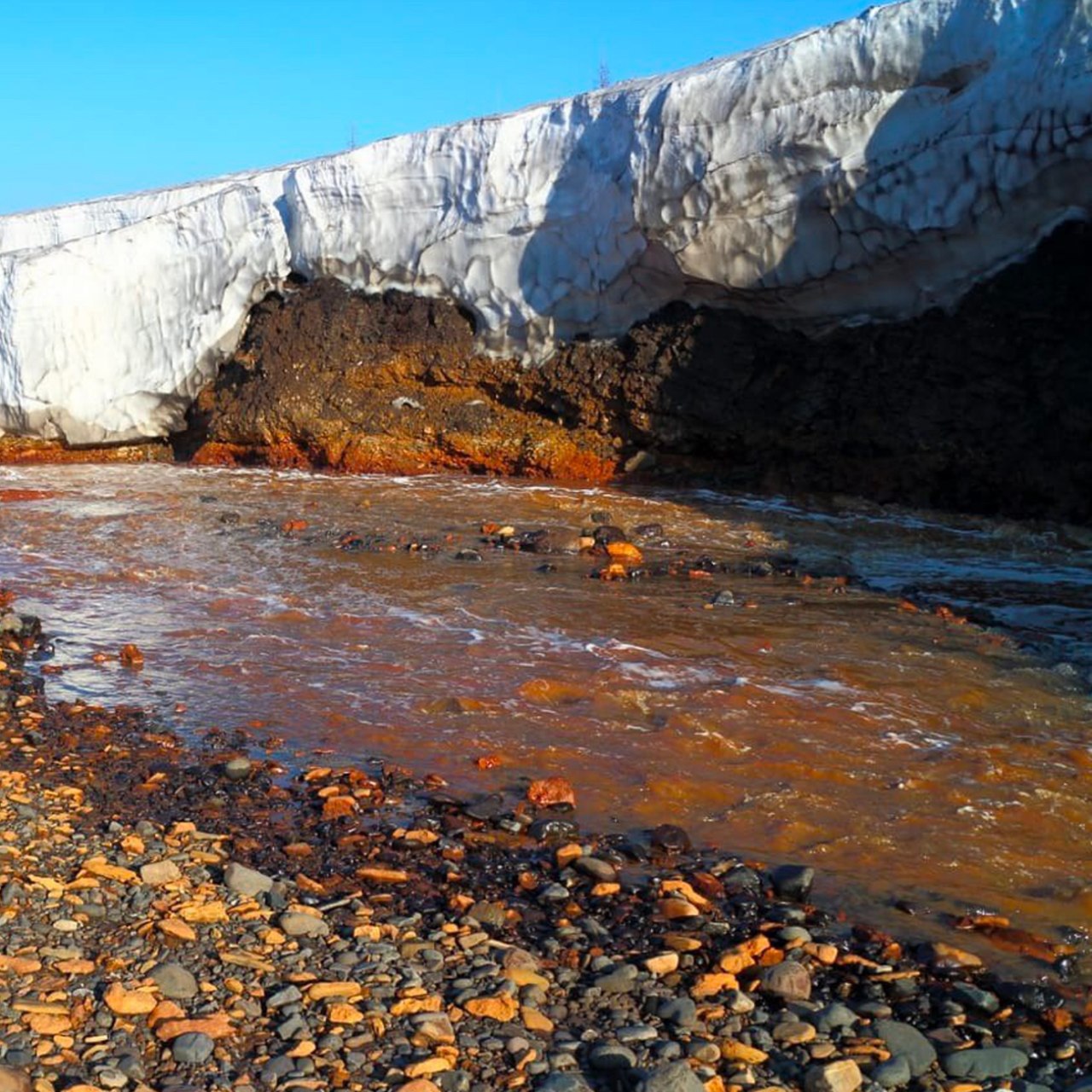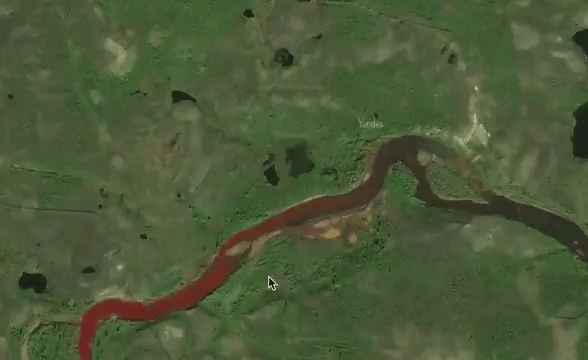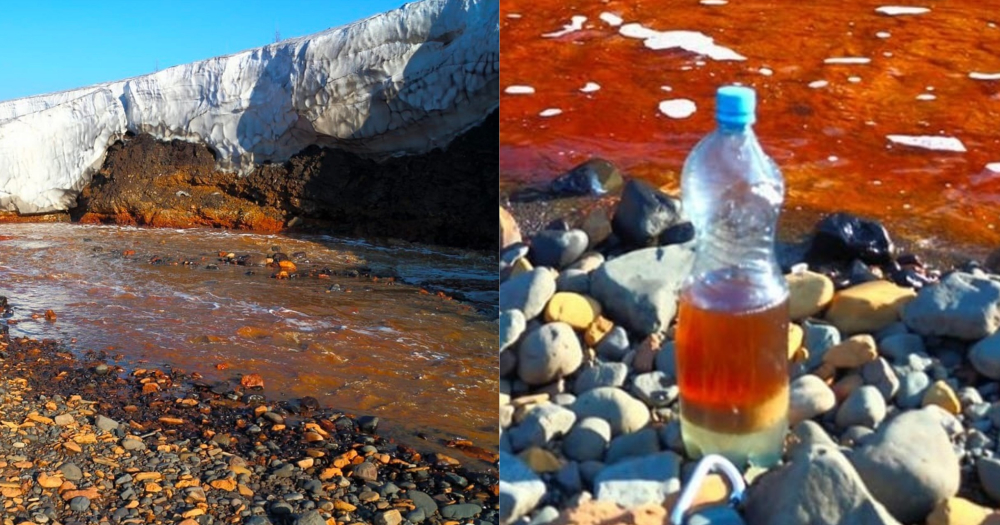Russia is currently the third-most affected country in the world with over 440,000 Covid-19 cases as of June 4.
On top of that, Russia is now dealing with an environmental crisis after 20,000 tonnes of diesel oil spilled into the Ambarnaya river in the Arctic Circle, outside the Russian city of Norilsk.
State of emergency in Norilsk after 20,000 tons of diesel leaks into Arctic river system. Fear that thawing permafrost caused damage to storage tank https://t.co/EYvzar8jUQ pic.twitter.com/oN4pOtLZy0
— The Siberian Times (@siberian_times) June 2, 2020
River in Arctic Circle blood red
The oil spill on May 29 was caused by the collapse of a power plant near Norilsk, owned by Norilsk Nickel.
The company is the world's largest producer of palladium, which also produces massive amounts of nickel, platinum and copper.
The oil spill was reported to have contaminated an area of 350 square km (close to half the size of Singapore) and the oil has drifted at least 12km away from the plant site, turning the Ambarnaya river blood red, BBC reported.
https://www.instagram.com/p/CA-Fv1ljDzL/
 Photo from Radionova Svetlana/Facebook.
Photo from Radionova Svetlana/Facebook.
 Photo from Radionova Svetlana/Facebook.
Photo from Radionova Svetlana/Facebook.
Here's a satellite view of the affected rivers, uploaded by Siberian Times on June 4:
 GIF from Siberian Times Twitter.
GIF from Siberian Times Twitter.
This is not the first time an oil spill has occurred at Norilsk Nickel's plant.
The company was fined less than USD$1,000 (S$1,396) for another oil spill incident in 2016.
Melting permafrost triggers collapse of power plant
The collapse of the power plant was believed to have been triggered by the melting of permafrost caused by climate change, resulting in a damage to the diesel oil storage tank.
In late-May, parts of the Arctic Circle even hit 30.1°C on May 22, 2020.
The heat wave was not an one-time event and has disconcerting repercussions, including destabilising permafrost, which buildings and infrastructures rest on, and emitting large amounts of greenhouse gases.
Quite remarkable temperatures in western Siberia today.
— Mika Rantanen (@mikarantane) May 21, 2020
For example 26.4°C as north as Arctic Circle (66.6°N) and 30.1°C at 62.5°N. pic.twitter.com/nH5TDipUMk
"Due to sudden subsidence of supports which served for more than 30 years without problems, the diesel fuel storage tank was damaged, resulting in a fuel leak," Norilsk Nickel said in its statement, Siberian Times reported.
Declare state of emergency after 5 days
Norilsk Nickel failed to report the incident immediately to the authorities as they attempted to contain the spill on their own.
This resulted in a two-day delay in governmental response, according to the Russian Minister for Emergencies Yevgeny Zinichev.
The region governor Alexander Uss said that he got to know about the oil spill via social media.
However, Norilsk Nickel claimed to have reported the incident in a "timely" manner in their official statement.
Russia's president Vladimir Putin ordered a state of emergency on June 3, five days after the incident happened.
The declaration activated federal support to the clean-up effort.
An investigation into the incident is also ongoing.
Meeting on cleaning up a fuel leak in the Krasnoyarsk Territory: the accident's causes and current developments https://t.co/KliAeFdD8i pic.twitter.com/TsIdPPJmzj
— President of Russia (@KremlinRussia_E) June 3, 2020
As of June 4 afternoon, over 300 tonnes of oil has been collected from the affected areas, according to Norilsk Nickel's update.
Updates on the oil spill in Norilsk as of the afternoon of June 4: 201 tonnes of diesel have been collected near the plant and about 137 tonnes of diesel have been collected from the Ambarka River; 1450 cubic metres of contaminated soil have also been removed.
— Nornickel (@NornickelGroup) June 4, 2020
Environmental disaster
Russia's Marine Rescue Service has installed six oil containment booms in a bid to stop the spill.
However, the weather, terrain and other geographical constraints have posed great challenges to the clean-up operation in this remote location.
Greenpeace Russia also said that the clean-up will be extremely difficult and most of the diesel fuel will likely remain in the river.
Russia's Federal Fisheries Agency estimated that the aquatic ecosystem of the affected waters will take more than a decade to recover, Moscow Times reported.
The head of the agency, Dmitry Klokov, said that the diesel oil can drift into Lake Pyasino, and eventually downstream to Pyasina River and further into the Kara Sea.
According to World Wildlife Fund (WWF) Russia, the oil spill can threatened not just the marine species but also the birds and other native animals.
Greenpeace compared this scale of oil spill to the Exxon Valdez disaster in Alaska that happened in 1989.
The massive oil spill then led to the passing of the landmark law in the U.S., the Oil Pollution Act, which strengthened the federal agencies' ability to prevent and punish those that cause catastrophic oil spills.
This is the first time such an accident has happened in the Arctic Circle and it is the second largest oil spill in modern Russia history in terms of volume, sources told BBC.
Top photos from Radionova Svetlana/Facebook
If you like what you read, follow us on Facebook, Instagram, Twitter and Telegram to get the latest updates.
